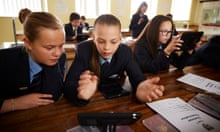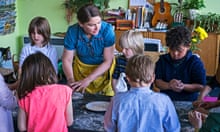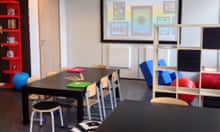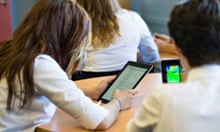At the London Acorn School, which is housed in a picturesque listed building owned by the National Trust and set in beautiful parkland in Morden, there are no smartphones, no iPads, no expensive ICT suites, interactive whiteboards or television screens.
What’s more, parents who enrol their children have to commit to the same strict regime at home, with no television, computers or films, either during term-time or holiday.
The school is appealing to parents concerned about the impact of screens and new technology on their children who are choosing a new brand of “lo-tech/no-tech” education, which bans computers, the internet, TV and films – both in class and at home.
When the Guardian visits the London Acorn School on a perfect late September morning, there’s a group going out on a nature walk; a birthday party is going on in the kindergarten with a celebratory carrot cake, and in the class one woodwork room – there are just two of them – children are working on their latest projects.

The pupils make their own exercise books and write in elegant looping longhand. In woodwork they contribute to the fabric of the school, making coat hooks for the younger children and an impressive old-fashioned lathe for the workshop.
The school opened in 2013. With just 42 pupils up to the age of 14 (they can accommodate 84) and annual fees of up to £11,000, London Acorn is only for the wealthiest. But it is doing its best to capitalise on the recent controversy surrounding the effectiveness of technology in schools and the wider impact on young people.
Earlier this month, a global study by the Organisation for Economic Co-operation and Development (OECD) found that investing heavily in computers and new technology in the classroom did not improve pupils’ performance, with frequent use of computers associated with lower results.
Other reports have raised concerns about the potentially negative impact of social media on young people, and disruptive behaviour associated with use of mobile phones and iPads in the classroom.
“We are against all forms of electronics for small children,” the school charter reads, “and only gradual integration towards it in adolescence. That includes the internet. In choosing this school, you have undertaken to support that view, no matter what you may feel personally.”

Many parents are concerned about the amount of time their children spend on screens – particularly at home – but the Acorn regime is not for the faint-hearted.
According to school rules, children are not allowed television at all before the age of 12, after that they are allowed documentaries that have previously vetted by parents. They cannot watch films until they are 14; the internet is banned completely for everyone under 16 – at home and and at school – and computers are only to be used as part of the school curriculum for over-14s.
“It’s a big ask for parents,” says Kevin Burchell, whose daughter Carmen, 12, joined the school last year. “But it’s worth it, because the results in terms of how the children are is very special. We are absolutely thrilled.
“I’m guessing it might be a bit easier for families whose kids go to the school from kindergarten. Carmen only joined the school last year. She had been to a mainstream primary school.
“It was only at the end that we learned about the Acorn School and we thought, this offers a response to some of the more difficult aspects that we had found with the kind of influence of all the screen technology at home. Their addictive nature.
“Once she was using the screens less at home, it was also cutting down on some of the more pernicious effects of popular culture. The pressure on her to be a certain way and behave in certain ways. And she has more time to do all sorts of other things.”
Carmen, who is great fun and has discovered a passion for sewing, says she was “a bit irritated” when she found out about the no-technology rules and still finds it awkward with her friends at other schools. “My friend’s got an iPad. She’s like, can we play games? And it’s like – I’m not allowed.
“I get annoyed sometimes that I can’t watch television. It’s being able to chat about it and stuff. But I like the fact I’ve got an imagination that lots of kids have not.”
Edward, 14, also joined the school last year. He’s not allowed to use a computer, but reads about computers avidly. “I wasn’t really too bothered. Even if you don’t use the computer you can still read about it. You don’t get as much as if you actually use the computer but it still helps.”
Out of a group of six 12- to 14-year-olds, four of them said they would like more access to new technology.
Janice Moore, mother of Zoe, 8, and three-year-old Amy who are both at the school, says she chose Acorn after seeing friends’ children thrive at a similar school without new technology.
“My husband works in IT, we are huge advocates of technology but age-appropriate. It’s very detrimental if it’s too much too soon. We’re not phobic – we’ve got iPhones and iPads. Zoe knows how to swipe and answer a call from her nanny when she calls, but playing with them – never. Zoe can play with fresh air for hours. She needs so little to be engrossed in play.”
Doesn’t Moore worry she’s depriving her daughters of vital skills for a digital future? Not at all. “With technology growing and changing at the rate it is, imagine how it’s all going to continue to accelerate in to the future. Anything we teach them now will be outdated.”
The school, which shares its ethos with the more established Acorn School in Nailsworth, Gloucestershire, is heavily influenced by the controversial Steiner system, which also discourages screens until the age of 12.
Two of the founders, Andrew Thorne and his wife, Sarah Fanconi Thorne, who is head of school, previously sent their two children to a Steiner school but were unhappy with some key aspects, in particular the mystical, or anthroposophical, ideas behind Steiner education, so set up their own.
“I love computers and all the things they can do,” says Fanconi Thorne, but not for young children. She is now hoping to expand and open an upper school for pupils who are 14+; their first project will be to build their own computer.
Tom Bennett, a teacher and behaviour expert, who is leading a government drive to improve classroom behaviour, recently raised questions about new technology in classrooms.
“I think it’s important that children are exposed to new technologies that will become part of their lives, in order for them to get the most out of their opportunities. However, schools shouldn’t feel they have to lead on this.
“One of their primary goals is to educate children in their cultural and academic inheritance, and tech for its own sake shouldn’t compromise that. But if schools can work out ways to integrate tech use that usefully complements that learning without harrowing their budgets, then they should feel free to do so.
“Children will encounter tech whatever schools do, particularly as it becomes cheaper and more pervasive. Most children – or adults – can become fluent with tech quite quickly, and schools shouldn’t feel that they have to plug an imagined skills gap that often doesn’t exist.”









Comments (…)
Sign in or create your Guardian account to join the discussion